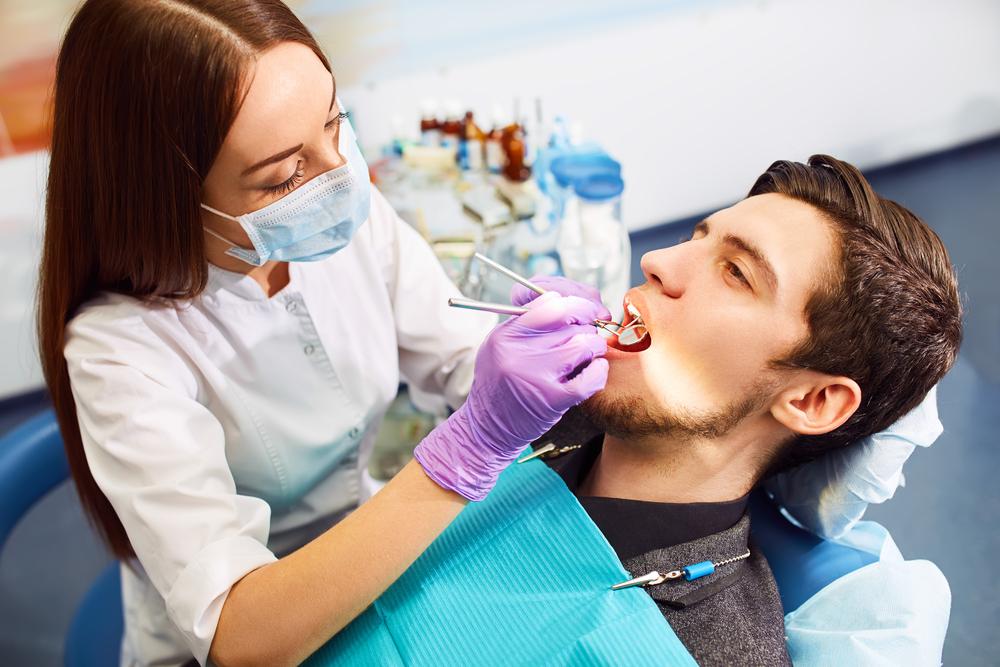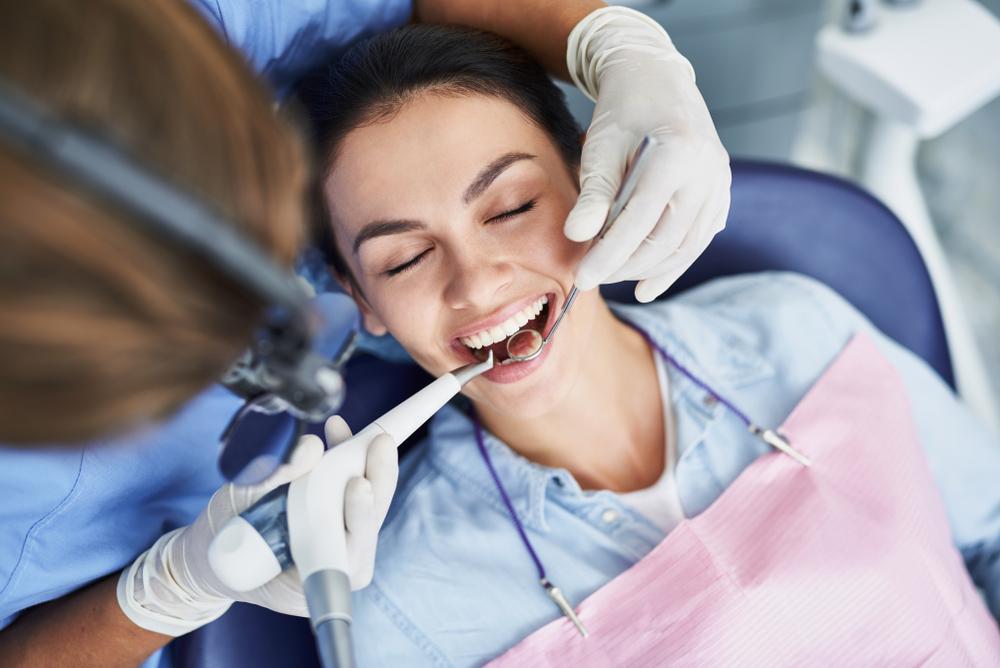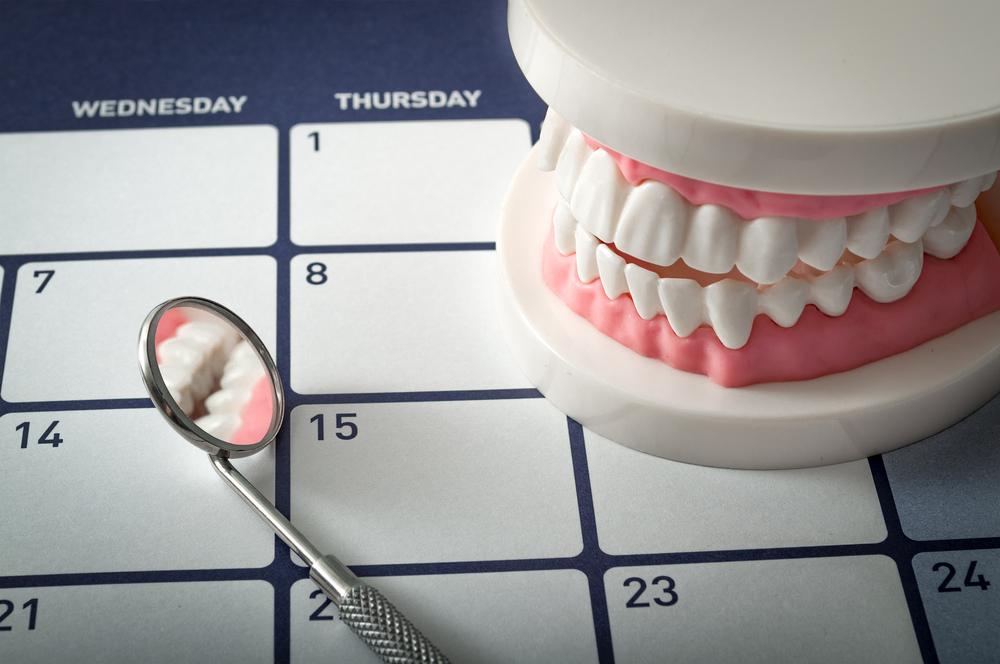The Importance of Dental Cleanings
Maintaining Healthy Teeth and Gums

Oral health is an integral part of our overall well-being, often serving as a silent indicator of our physical health. While we diligently brush and floss to maintain a radiant smile, there is a crucial aspect of oral care that often goes unnoticed but is equally, if not more, vital. It’s the routine visit to your dentist for dental cleanings. In this article, we’ll embark on a journey to explore the often-underestimated significance of dental cleanings in preserving oral health and, by extension, our general well-being.
Our mouths are not only the gateway to nutrition, communication, and self-expression but also a vital component of our overall health. The condition of our teeth and gums can influence our ability to consume nourishing foods, communicate effectively, and present ourselves with confidence.
Dental cleanings, often seen as a routine dental appointment, hold the power to protect our oral health, prevent dental issues, and play a pivotal role in maintaining that bright, healthy smile we all cherish. Let’s delve into the reasons why dental cleanings are more than just a dental procedure – they are a cornerstone of oral health and, consequently, our broader well-being.
FAQ’S
Defining Dental Cleanings
Dental cleanings, also known as dental prophylaxis or teeth cleaning, are procedures performed by dental professionals to remove dental plaque, tartar (calculus), and stains from the teeth. These cleanings are fundamental to maintaining oral health, as they aim to prevent dental issues and promote optimal oral hygiene. Dental cleanings are typically recommended on a routine basis, with the frequency determined by the individual's oral health needs.
Types of Dental Cleanings
- Routine Cleanings: Routine dental cleanings are the most common type and are typically performed every six months. These cleanings focus on the removal of dental plaque, tartar, and stains from the teeth, as well as a thorough examination of the oral cavity to identify any potential issues early on.
- Gingivitis Cleanings: These cleanings are done when the initial stage of gum disease, or gingivitis, is present. Gingivitis often is identifiable by sore and bleeding gums. Gingivitis is a bacterial infection, and thus this type of cleaning is geared toward eliminating the bacterial culprits of infection.
- Deep Cleanings (Scaling and Root Planing): Deep cleanings, also known as scaling and root planing, are prescribed when there is evidence of periodontal disease, or the advanced stages of gum disease. These cleanings go beyond the surface and address the buildup of plaque and tartar below the gumline. The process involves scaling (removing tartar and bacteria) and root planing (smoothing the tooth roots to prevent bacterial attachment).
The Role of Dental Hygienists
Dental hygienists play a pivotal role in the dental cleaning process at Kokomo Family Dentistry. They are licensed professionals who specialize in preventive oral healthcare and are dedicated to your oral well-being. During a dental cleaning, our hygienists perform several crucial tasks, ensuring that you receive top-notch care and guidance:
1. Assessment: Our hygienists assess your oral health, meticulously noting any changes or concerns. This step is crucial in tailoring your treatment to your specific needs. This assessment includes detailed charting of gum pockets, recession, bleeding, and mobility of teeth.
2. Cleaning: Using specialized instruments, our hygienists expertly remove dental plaque, tartar, and stains from your teeth. This thorough cleaning helps maintain the health and radiance of your smile.
3. Polishing: After the cleaning, our hygienists often perform tooth polishing to remove surface stains, leaving your teeth looking and feeling their best.
4. Education: Our dedicated hygienists take the time to educate you about proper oral hygiene practices. They share valuable insights into effective brushing and flossing techniques, empowering you to maintain a healthy smile.
5. Oral Health Recommendations: Beyond the cleaning, our hygienists provide personalized recommendations for ongoing oral care. If necessary, they may suggest additional treatments such as fluoride applications or dental sealants to enhance your oral health.
Dental cleanings are essential for maintaining your oral health, as they remove plaque and tartar buildup, prevent dental issues, and promote good oral hygiene practices. At Kokomo Family Dentistry, our dental hygienists are committed to your well-being, ensuring that you receive the highest standard of care and personalized guidance for a healthy, radiant smile.
Benefits of Regular Dental Cleanings
Regular dental cleanings are a cornerstone of preventive oral healthcare. They serve as a vital proactive measure in maintaining oral health. By removing dental plaque and tartar, cleanings help prevent the onset and progression of various dental issues. These appointments are not only about addressing existing problems but also about safeguarding your oral health for the future.
Preventing Common Dental Issues
1. Cavities (Dental Caries): Dental cleanings help prevent cavities by eliminating plaque, which is a breeding ground for harmful bacteria. Plaque contains acids that erode tooth enamel, leading to cavities. By removing plaque through cleanings, the risk of cavities is significantly reduced.
2. Gum Disease (Periodontal Disease): Cleanings are instrumental in preventing gum disease. The removal of plaque and tartar is crucial. When left untreated, the bacteria in plaue and tartar can lead to gum disease, periodontal disease, tooth loss, and even systemic health issues.
3. Bad Breath (Halitosis): Bad breath often stems from bacteria in the mouth. Dental cleanings target these bacteria, helping to maintain fresh breath.
Early Detection of Oral Health Problems
Dental cleanings are not solely about cleaning; they also provide an opportunity for early detection of oral health issues. During the cleaning appointment, dental professionals conduct a thorough examination of the oral cavity. This examination can reveal early signs of problems such as:
1. Oral Cancer: Regular cleanings include oral cancer screenings, where any suspicious lesions or abnormalities can be identified at an early stage, improving the chances of successful treatment.
2. Tooth Decay and Cracks: By examining the teeth closely, dental professionals can identify tooth decay and cracks early on, preventing the need for more extensive treatment.
3. Gum Issues: Signs of gum disease, like bleeding or swollen gums, can be detected during cleanings, allowing for prompt intervention.
In essence, regular dental cleanings are preventive measures that help maintain oral health by preventing common dental issues and enabling the early detection of potential problems. This proactive approach ensures that oral health is not compromised and that any issues are addressed in their nascent stages, leading to more effective and less invasive treatments.
Step-by-Step Process of Dental Cleanings
Dental cleanings, also known as dental prophylaxis or teeth cleaning, are procedures performed by dental professionals to remove dental plaque, tartar (calculus), and stains from the teeth. These cleanings are fundamental to maintaining oral health, as they aim to prevent dental issues and promote optimal oral hygiene. Dental cleanings are typically recommended on a routine basis, with the frequency determined by the individual's oral health needs.
1. Oral Assessment: The dental cleaning appointment usually begins with an oral assessment. The dental hygienist or dentist will examine your mouth to check for any visible issues, such as cavities, gum disease, or oral lesions. This step is essential for identifying any potential problems that need attention.
2. Scaling: The next step involves the removal of dental plaque and tartar (calculus) from the teeth. Dental instruments, known as scalers or curettes, are used to scrape away these deposits. The process may produce scraping sounds, which is normal and should not be a cause for concern.
3. Tooth Polishing: After scaling, a special polishing tool and gritty toothpaste are used to clean and polish the teeth. This step removes surface stains and leaves your teeth feeling smooth.
4. Flossing: Dental professionals will floss your teeth to ensure that no debris or plaque is trapped between them. Flossing also allows for a final check to confirm that all areas have been adequately cleaned.
5. Fluoride Treatment (Optional): Depending on your oral health needs, a fluoride treatment may be recommended. Fluoride helps strengthen the enamel and offers additional protection against cavities.
6. Oral Health Education: Dental hygienists often provide guidance on proper oral hygiene practices, such as effective brushing and flossing techniques. They may also discuss diet and lifestyle factors that impact oral health.
Tools and Techniques Used During the Cleaning Procedure:
1. Scalers and Curettes: These instruments are essential for removing dental plaque and tartar. They come in various shapes and sizes to access different areas of the mouth.
2. Polishing Tools: Dental hygienists use a rotary brush or rubber cup with gritty toothpaste for polishing the teeth. This step helps remove surface stains and leaves teeth looking clean and shiny.
3. Floss: Flossing is performed to ensure all surfaces between teeth are clean and free of debris.
4. Fluoride Treatment: A fluoride gel, foam, or varnish may be applied to the teeth for added protection.
Addressing Patient Concerns and Discomfort:
It's common for patients to have concerns or experience slight discomfort during dental cleanings. Our dental professionals at Kokomo Family Dentistry are trained to address these issues. If you have specific concerns, such as dental anxiety or sensitivity, communicate them with our dental team. We can adapt our approach to make you more comfortable. Some common concerns and how they can be addressed include:
1. Dental Anxiety: For patients with dental anxiety, we offer relaxation techniques or sedation options to ease their nerves.
2. Tooth Sensitivity: If you have sensitive teeth, inform your hygienist so they can use techniques and materials that minimize discomfort.
3. Gag Reflex: Patients with a strong gag reflex can signal the hygienist when they need a break during the procedure.
A typical dental cleaning appointment involves several steps, including an oral assessment, scaling, tooth polishing, and oral health education. Our highly skilled dental professionals use various tools and techniques to ensure that your teeth and gums are thoroughly cleaned. If you have concerns or experience discomfort, open communication with our dental team can help make the experience more comfortable and tailored to your needs.
How Often Individuals Should Schedule Dental Cleanings?
The frequency of dental cleanings can vary from person to person based on their unique oral health needs. However, there are general guidelines that can help individuals determine how often they should schedule dental cleanings:
1. Routine Cleanings: For most individuals with good oral health, routine dental cleanings are typically recommended every six months. This biannual schedule helps maintain oral health and prevent common dental issues.
2. Special Considerations: Some individuals may require more frequent cleanings due to specific oral health conditions. Those with a history of gingivitis, periodontal disease, frequent cavities, or ongoing dental concerns may benefit from cleanings every three to four months.
The Importance of Regularity in Maintaining Oral Health:
Regularity in scheduling dental cleanings is vital for maintaining optimal oral health. The key reasons for this include:
1. Prevention: Dental cleanings help prevent dental issues by removing plaque, tartar, and bacteria that can lead to cavities, gum disease, and other oral health problems. By sticking to a regular cleaning schedule, you reduce the risk of these issues developing.
2. Early Detection: Regular dental cleanings also provide an opportunity for early detection of potential problems. Our dental professionals at Kokomo Family Dentistry can identify issues in their early stages, making treatment more effective and less invasive.
3. Long-Term Oral Health: Consistency in dental cleanings promotes long-term oral health. By addressing issues promptly and maintaining healthy teeth and gums, individuals can enjoy a lifetime of good oral health.
Recommended Intervals for Cleanings:
The American Dental Association (ADA) recommends that individuals discuss their specific dental cleaning schedule with their dentist or dental hygienist. They will assess the individual's oral health and provide personalized recommendations. While the standard is often every six months for routine cleanings, this schedule may be adjusted based on an individual's unique circumstances.
The recommended frequency for dental cleanings varies from person to person. However, routine cleanings are typically advised every six months for those with good oral health. Regularity in scheduling cleanings is crucial for preventing dental issues, detecting problems early, and ensuring long-term oral health. To determine the best cleaning schedule for your specific needs, consult with our Kokomo Family Dentistry team.
Special Considerations for Individuals with Specific Oral Health Conditions
While routine dental cleanings are essential for most individuals, there are special considerations for those with specific oral health conditions. Here are some common scenarios that require tailored care:
1. Gum Disease or Periodontal Disease: Individuals with gingivitis or periodontal disease often need more frequent cleanings, typically every three to four months, to manage their condition effectively. These more in-depth cleanings target the buildup of tartar below the gumline and help control the disease progression.
2. Cavities and Tooth Decay: Patients with a history of frequent cavities may benefit from additional treatments like dental sealants or fluoride applications to strengthen their enamel and prevent future cavities.
3. Sensitivity Issues: Individuals with tooth sensitivity may require desensitizing treatments or special toothpaste recommendations to manage their discomfort.
4. Orthodontic Appliances: Patients with braces or orthodontic appliances often require more meticulous cleanings due to the increased risk of plaque buildup around brackets and wires. Special tools and techniques are used in these cases.
5. Medical Conditions: Certain medical conditions, like diabetes or autoimmune disorders, can impact oral health. Individuals with these conditions may need more frequent dental cleanings to manage potential oral complications.
Additional Treatments That May Accompany Dental Cleanings:
In addition to the standard cleaning process, there are several supplementary treatments that dental professionals may recommend, depending on an individual's oral health needs:
1. Fluoride Treatments: Fluoride is often applied topically to the teeth to strengthen enamel and make them more resistant to decay. This is especially beneficial for individuals at a higher risk of cavities.
2. Dental Sealants: Dental sealants are thin protective coatings applied to the chewing surfaces of molars and premolars. They provide an extra layer of defense against cavities, making them particularly useful for children and those prone to cavities.
3. Desensitizing Treatments: Patients with tooth sensitivity may receive desensitizing treatments or recommendations for specific toothpaste and mouthwash products to alleviate discomfort.
4. Oral Cancer Screenings: In addition to the cleaning process, dental professionals routinely perform oral cancer screenings to detect any early signs of oral cancer.
5. X-rays and Imaging: Dental professionals may recommend X-rays or other imaging to assess oral health more comprehensively and detect issues that may not be visible during a standard examination.
Individuals with specific oral health conditions, such as gum disease, cavities, sensitivity, or orthodontic appliances, may require tailored dental care. Our dental professionals at Kokomo Family Dentistry may recommend additional treatments like fluoride applications, dental sealants, desensitizing treatments, and oral cancer screenings to address unique needs and enhance overall oral health. The specific treatments will depend on individual circumstances and should be discussed with your Kokomo Family Dentistry team during your appointments.
Conclusion:
In summary, dental cleanings are the unsung heroes of oral health, working to prevent dental problems and maintain our radiant smiles. These routine appointments play a crucial role in preventing cavities, gum disease, and bad breath by removing harmful plaque and tartar. Additionally, they offer early detection of potential issues, from cavities to oral cancer, ensuring effective and less invasive treatments. To maintain a healthy smile, prioritize regular dental cleanings, and remember that they are an essential component of oral healthcare. Our dental team is your ally in this endeavor, ready to help you achieve the best possible oral health and overall well-being.





Let’s Get Started
Call Us:
Office Hours :
Mon-Fri: 8:00am-5:00pm
Email Us :
appointments@kokomodentistry.com
Address :
604 East Boulevard, Suite A, Kokomo, IN 46902








